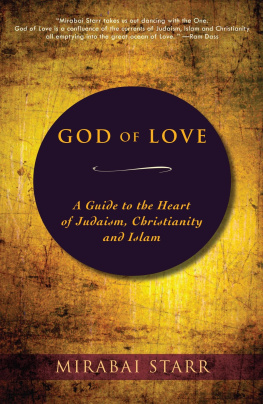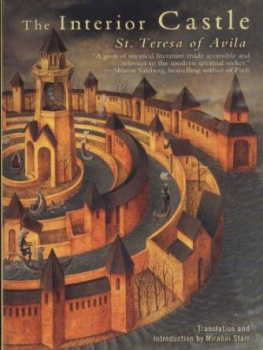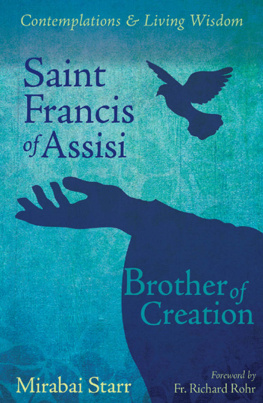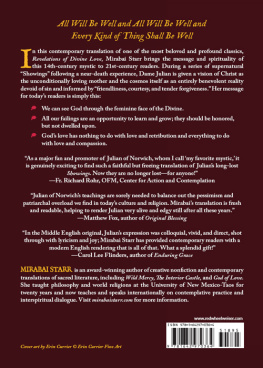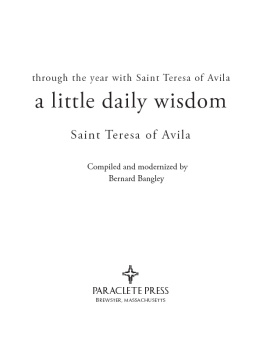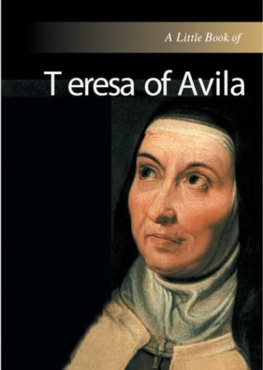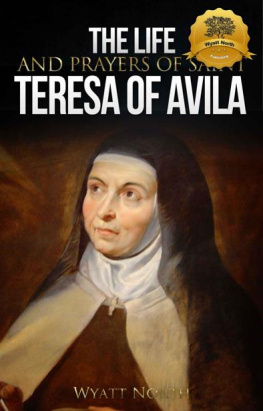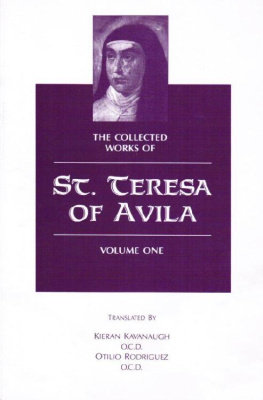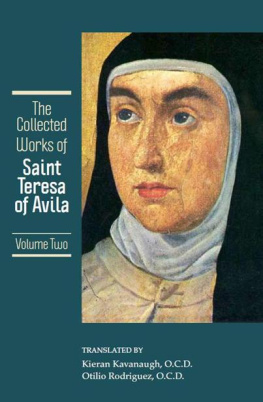
Contents
Opening Prayer
Praise to you,
Saint Teresa of Avila,
whose wisdom, courage, and humor
flow so abundantly through the centuries,
bringing vibrant life
to the garden of our souls.
With passion and grace
you transcended the limits imposed upon you
and became a timeless teacher
of the Way of Love.
You lived that beautiful balance
between active service
and quiet contemplation.
Teach us to be of use in this troubled world
at the same time that we cultivate
joyous intimacy
with the Beloved who lives inside us.
Thank you.
Amen.
Foreword
AS I READ this magnificent book, I felt the familiar grace of Teresa of Avila sparkling all around me yet again. I savored every page of Mirabais book, as having known her for years I am aware that Mirabai understands the same Spanish dialect that Teresa of Avila spoke. I know that she translated Teresas writings from Spanish to English. I know that she knows Teresa of Avila in the deep and intimate way that comes not only from scholarship, but also from genuine love and perhaps the assistance of spiritual revelation.
Mirabai is a perfectionist and an archivist when it comes to the life of Teresa of Avila. She is also an elegant writer who can make prose flow like poetry across the pages. This book brings the best of her talents together in a tribute to Teresa of Avila. I adored every page and have read it several times. I have no doubt that I will read this book for many years to come.
Mirabai and I share yet another bond that is almost so obvious that it goes unnoticed and almost always unspoken. We do not just have a mutual interest in Teresa of Avila. We have a deep and abiding belief in the presence and influence of the realm of the saints and the sacred, most especially Teresa of Avila. While I hesitate to speak too personally for Mirabai, I know that her devoted interest in Teresa of Avila and John of the Cross are fueled by a passionate faith in both of these saints. The same is true for me. This is worth discussing, as Mirabai has compiled selections of Teresas writings that have in common wisdom and insights for which she has become well known. But the value of her writings would mean a bit more if you could connect to Teresa of Avila as a saint; that is, a fully active, holy soul who continues to be available (the best way to put it) to those who ask for divine intervention or guidance.
Having a devotion to a saint or even thinking about such things is so old world these days. It harkens back to traditional religion and for Catholics, that journey backwards is sadly filled with scar tissue that covers all that was and still is quite precious, such as the tradition of miracles and saints that literally originated with Jesus. The study of miracles, healing, apparitions, and mystical experiences is known as the mystical traditional of Catholicism. Teresa of Avila is known as a Mystical Theologian as well as a saint, and further, is honored as a Doctor of the Catholic Church. The traditional Catholic Church, meaning the priests and bishops, viewed her with suspicion, in fact, as her own mystical experiences gradually gave her an authority about the nature of God and the soul that far exceeded their understanding. She outwitted these insecure lesser mortals running the Vatican with the skill of an Olympic athlete, as she knew that she was actually experiencing a relationship with Jesus, and all Church authorities could do was debate words about which ideas had more power. She, in the meantime, was having out of body experiences in which her soul became ever more enlightenedin the words of Buddhaso much so that her physical form would lift off the Earth from the Light she embodied. Meanwhile, the boys in the Vatican were fretting over money, power, and sex and how to control the advancing intellectual life of the public. The invention of the printing press was a nightmare for the fundamentalists at the Vatican. So you can appreciate that Teresa of Avila was a potential intellectual and a mystical threat to Rome, as she was known as a visionary, she was founding convents, and she was writing books on the nature of God and the soul. From where was she getting this knowledge? If her writings and experiences proved to be authentic, true, and even holy, even the hard-core representatives of the Spanish Inquisition would have to bow to this woman and recognize her as a saint in progress.
Obviously Teresa of Avila went on to become a great saint. But what does that mean? I was never attracted to or interested in Saint Teresa of Avila until I wanted to use some of her teachings from The Interior Castle in a class I was teaching. I read very little about her work but I knew she had written about the soul having seven mansions. I read the introduction to The Interior Castle in preparation for the class and brief descriptions of the seven mansions, as I was only going to mention her work. I had no intention of giving a major lecture on Teresa of Avila. For one thing, I lacked the necessary academic background in her work to lecture extensively on the life and work of this saint. I intended only to do a superficial presentation on her contribution as a mystic. But as soon as I began my talk of Teresa of Avila, something profound happened that for me was a deeply holy mystical experience. I felt the presence of Saint Teresa of Avila and I was suddenlyinstantlyfilled with an understanding of her work. I knew the body of her work as if I had studied it all my life. And even beyond that, I was filled with awe because of the significance of her work.
That experience redirects my life even to this day. I plunged into the writings of Teresa of Avila, devouring every word. I read her books over and over again. I began to see the world through a mystical lens that gave me the perspective that the work of Teresa of Avila, as well as other great mystics such as John of the Cross and Ignatius Loyola, needed to be brought back into our contemporary lives because we are starved not for religion, but for the mystical life. We are endlessly looking, searching, seekingbut for what? People give me answers like happiness, tranquility, and peace. Those are just words.
People are really afraid to say what they are seeking. People are not seeking happiness; they are seeking the sacred, the holy. They are waiting to hear God call them by name. Theyyouare longing to know that this life you have been given has purpose and that beyond this life is yet another. Saints are individuals who have been called by name during their lives and they bear witness to the truth that a force much greater than us governs this world of ours. Their lives are mysteries to us because we cannot comprehend the phenomena that they have experienced, and yet their heightened abilities to heal, their refined insights into the nature of the soul, and their profound understandings of Divinity tell us that their souls have been escorted to realms beyond human imaginationperhaps even to the gates of heaven itself.
Do these saints remain in contact with human beings after they depart the Earth? Here, we can only share what we have experienced. Yesthats my response to the question. Proof? I have endless proof that I cannot prove whatsoever. But I know that saints will involve themselves in your lifeyes indeed, they will. They wont do your dirty laundry and they dont do magic. They wont clean up your bad spending habits and so forth. But they are brilliant at guidance. They operate in the subtle realms, like grace. As Teresa emphasized, your way into that realm is prayer. You cant think or talk your way into the altitude of grace.
Next page

